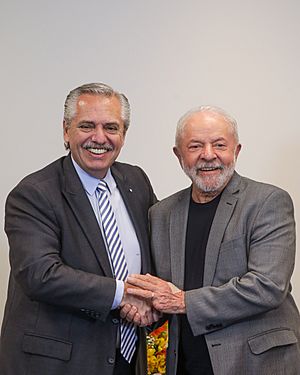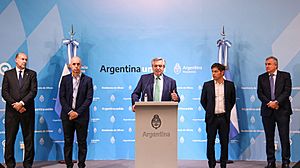Alberto Fernández facts for kids
Quick facts for kids
Alberto Fernández
|
|
|---|---|
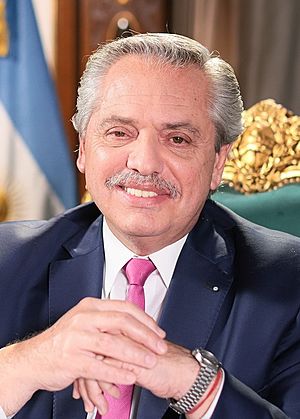
Official portrait, 2021
|
|
| 58th President of Argentina | |
| In office 10 December 2019 – 10 December 2023 |
|
| Vice President | Cristina Fernández de Kirchner |
| Preceded by | Mauricio Macri |
| Succeeded by | Javier Milei |
| Chief of the Cabinet of Ministers | |
| In office 25 May 2003 – 23 July 2008 |
|
| President |
|
| Preceded by | Alfredo Atanasof |
| Succeeded by | Sergio Massa |
| Legislator of Buenos Aires City | |
| In office 7 August 2000 – 25 May 2003 |
|
| Constituency | At-large |
| Superintendent of Insurance | |
| In office 1 August 1989 – 8 December 1995 |
|
| President | Carlos Menem |
| Preceded by | Diego Peluffo |
| Succeeded by | Claudio Moroni |
| Personal details | |
| Born |
Alberto Ángel Fernández
2 April 1959 Buenos Aires, Argentina |
| Political party |
|
| Other political affiliations |
|
| Spouse |
Marcela Luchetti
(m. 1993; div. 2005) |
| Domestic partners |
|
| Children | 2 |
| Alma mater | University of Buenos Aires |
| Occupation |
|
| Signature | |
Alberto Ángel Fernández (born 2 April 1959) is an Argentine politician, lawyer, and professor. He served as the President of Argentina from 2019 to 2023. Before becoming president, he was the Chief of the Cabinet of Ministers from 2003 to 2008. This was the longest time anyone had held that position since it was created in 1994.
Born in Buenos Aires, Alberto Fernández studied at the University of Buenos Aires. He became a lawyer at age 24 and later taught criminal law. He is a member of the Justicialist Party, which follows the ideas of Peronism. He started working in public service as an adviser. In 2003, he became the Chief of the Cabinet of Ministers for President Néstor Kirchner. He continued in this role for the first few months of President Cristina Fernández de Kirchner's time in office.
In 2019, Fernández ran for president as part of the Frente de Todos alliance. He won the election against the sitting president, Mauricio Macri. His time as president was greatly affected by the COVID-19 pandemic in Argentina. He put in place strict rules to stop the virus from spreading. He also faced a big debt problem that he inherited. Even though the economy improved in 2021–2022, prices kept going up very quickly. In April 2023, he announced he would not run for president again. Javier Milei took over as president on 10 December 2023.
Contents
Early Life and Career
Alberto Fernández was born in Buenos Aires. He considers Carlos Pelagio Galíndez, his mother's second husband, to be his father.
He went to the University of Buenos Aires to study law. He finished his law degree when he was 24. Later, he became a professor who taught about criminal law. He started working for the government as an adviser. He also worked for the Economy Ministry. There, he helped Argentina in important trade talks.
From 1989 to 1995, he was the Superintendent of Insurance for Argentina. This meant he oversaw insurance companies. He also advised on insurance laws for groups like Mercosur. He worked in private companies related to insurance and health.
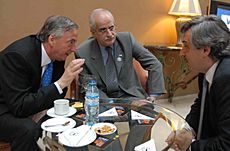
In 2000, he was elected to the Buenos Aires City Legislature. This is like being a city council member.
Chief of the Cabinet (2003–2008)
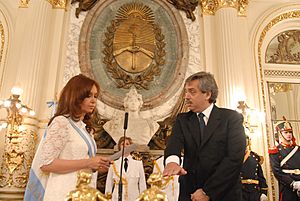
When Néstor Kirchner became president on 25 May 2003, he chose Fernández to be his Chief of the Cabinet of Ministers. This role is like a chief of staff for the president. Fernández kept this job when Kirchner's wife, Cristina Fernández de Kirchner, became president in 2007.
In 2008, there was a big disagreement between the government and farmers over new taxes on farm exports. Fernández was the government's main negotiator. But the talks failed. After a key vote in the Senate went against the government, Fernández resigned on 23 July 2008.
Before Becoming President
After leaving the Cabinet, Fernández became the head of the Justicialist Party in City of Buenos Aires. He supported Cristina Kirchner for re-election in 2011. He also managed the presidential campaign for Sergio Massa in 2015.
Presidential Elections
Presidential Campaign
On 18 May 2019, Cristina Fernández de Kirchner announced that Alberto Fernández would run for president, and she would be his vice president.
To gain more support, Fernández made an agreement with Sergio Massa. They formed an alliance called Frente de Todos. Massa agreed to support Fernández and was offered an important role if Fernández won. Fernández also got support from the main workers' union, promising to improve the economy and not change labor laws.
General Elections
On 11 August 2019, Fernández won the primary elections with 47.7% of the votes, while the current president, Mauricio Macri, received 31.8%. After this, Fernández spoke with Macri and said he would help him finish his term smoothly.
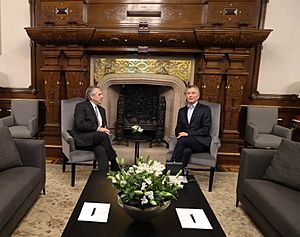
In the main election on 27 October 2019, Fernández won the presidency with 48.1% of the votes, beating Macri who got 40.4%. This meant he won without needing a second round of voting. His victory was largely due to strong support in Buenos Aires Province.
Presidency (2019–2023)
| Presidential styles of Alberto Fernández |
|
|---|---|
 |
|
| Reference style | Excelentísimo Señor Presidente de la Nación (Most Excellent President of the Nation) |
| Spoken style | Presidente de la Nación (President of the Nation) |
| Alternative style | Señor Presidente (Mister President) |
Inauguration
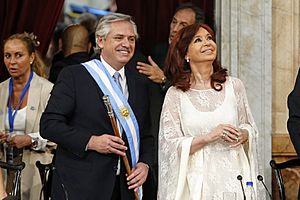
Fernández became president on 10 December 2019.
Economic Policy
Soon after taking office, his government made some economic changes. They put in place an emergency plan for jobs. They also passed a law to help the economy recover. This law included some tax increases. It also froze utility prices for a while. It gave extra money to retirees and families in need.
The government also worked to change the terms of Argentina's large debt. Argentina owed money to private lenders and the International Monetary Fund.
In May 2020, Argentina missed a payment to its lenders. This is called a default. The government continued talks to change the debt terms.
The COVID-19 crisis greatly affected Argentina's economy. The economy shrank, and unemployment increased. In August 2020, Fernández reached an agreement with major lenders to restructure a large part of the country's debt.
By the end of 2020, official reports showed a big drop in the country's economic activity. The poverty rate also increased.
Social Policy
In August 2020, there were protests in many Argentine cities. People were protesting against some of Fernández's social policies. They were also concerned about the government's rules during the pandemic.
Foreign Relations
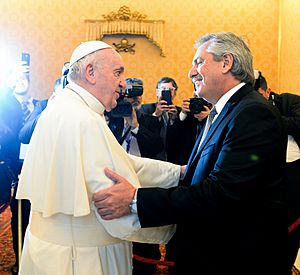
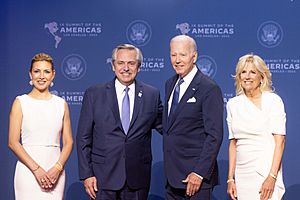
During his presidency, Argentina's relationship with Brazil became a bit tense. However, Fernández and Brazilian President Jair Bolsonaro later agreed on the importance of working together.
Argentina also changed its stance on Venezuela. It left the Lima Group, which was formed to address the crisis there. Fernández's government recognized Evo Morales as the leader of Bolivia and gave him asylum in Argentina.
In January 2020, Fernández visited Israel. He met with Prime Minister Benjamin Netanyahu. He also honored the victims of the Holocaust.
Fernández also worked to improve ties with China. He visited Beijing during the 2022 Winter Olympics. China supported Argentina's claim over the Falkland Islands.
In February 2022, Russia invaded Ukraine. Fernández condemned the invasion. Argentina voted at the UN to condemn Russia and asked for Russian forces to leave Ukraine. He also promised to send more aid to Ukraine. However, he did not support sanctions against Russia or sending weapons to Ukraine.
COVID-19 Pandemic and Measures
During the COVID-19 pandemic, Fernández's government announced a country-wide lockdown. This meant people had to stay home. Borders were closed, and schools were shut down. The lockdown started on 20 March 2020 and was extended several times.
The government also announced a large financial aid package. This included a one-time payment for people with lower incomes. Banks were initially closed, which caused problems for many people, especially retirees, who needed to get cash.
The lockdown caused a big drop in Argentina's economic activity. Many businesses suffered. Schools were closed for over a year. It is believed that many children stopped attending school during this time.
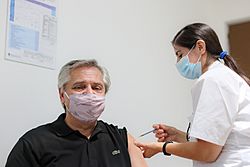
On 21 January 2021, Fernández was one of the first leaders in Latin America to get the Sputnik V vaccine. He also received a booster shot later.
In February 2021, the Health Minister resigned. This happened after it was found that some people received the COVID-19 vaccine before others.
Justicialist Party Chairmanship
On 22 March 2021, Fernández was elected as the new national chairman of the Justicialist Party. He ran without opposition and had support from different groups within the party.
Midterm Elections 2021
In the November 2021 elections, Fernández's party, Frente de Todos, lost many seats. They lost their majority in the Senate. This was the first time in almost 40 years that the Peronist party did not control the Senate. The opposition party gained power in areas that usually supported the Peronists. Many people thought this was because of high inflation and increasing poverty. With fewer seats in Congress, the government now needs to negotiate more to pass new laws.
Post-Presidency (2023–present)
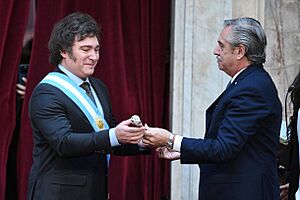
Alberto Fernández was invited to be an observer for the 2024 Venezuelan presidential election. He stated that the winner should be accepted, and the loser should accept defeat, as that is how democracy works. However, he was later asked not to travel, as his comments suggested he might not be an impartial observer.
Fernández stepped down as president of the Justicialist Party in August 2024.
Personal Life
Alberto Fernández married Marcela Luchetti in 1993, and they separated in 2005. They have one child, Tani Fernández Luchetti (born 1994), who is known for being a performer.
From 2014 to 2024, Fernández was in a relationship with journalist and actress Fabiola Yáñez. She served as the First Lady of Argentina during his presidency. They have a son, Francisco Fernández Yáñez, who was born on 11 April 2022.
Fernández is also an Honorary Professor at Tsinghua University. He is a fan of the Argentinos Juniors football team.
Images for kids
See also
 In Spanish: Alberto Fernández para niños
In Spanish: Alberto Fernández para niños
 | Kyle Baker |
 | Joseph Yoakum |
 | Laura Wheeler Waring |
 | Henry Ossawa Tanner |


